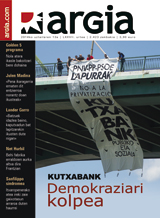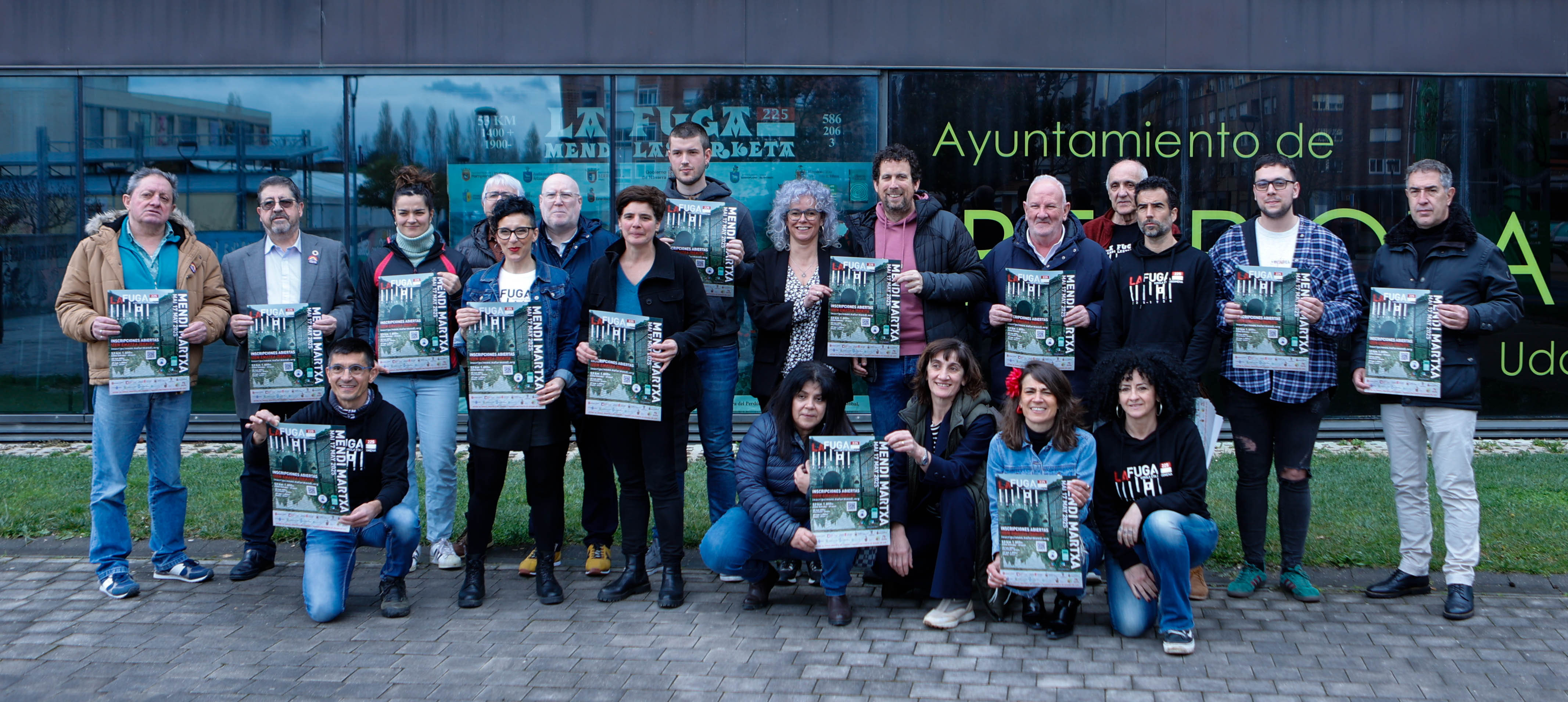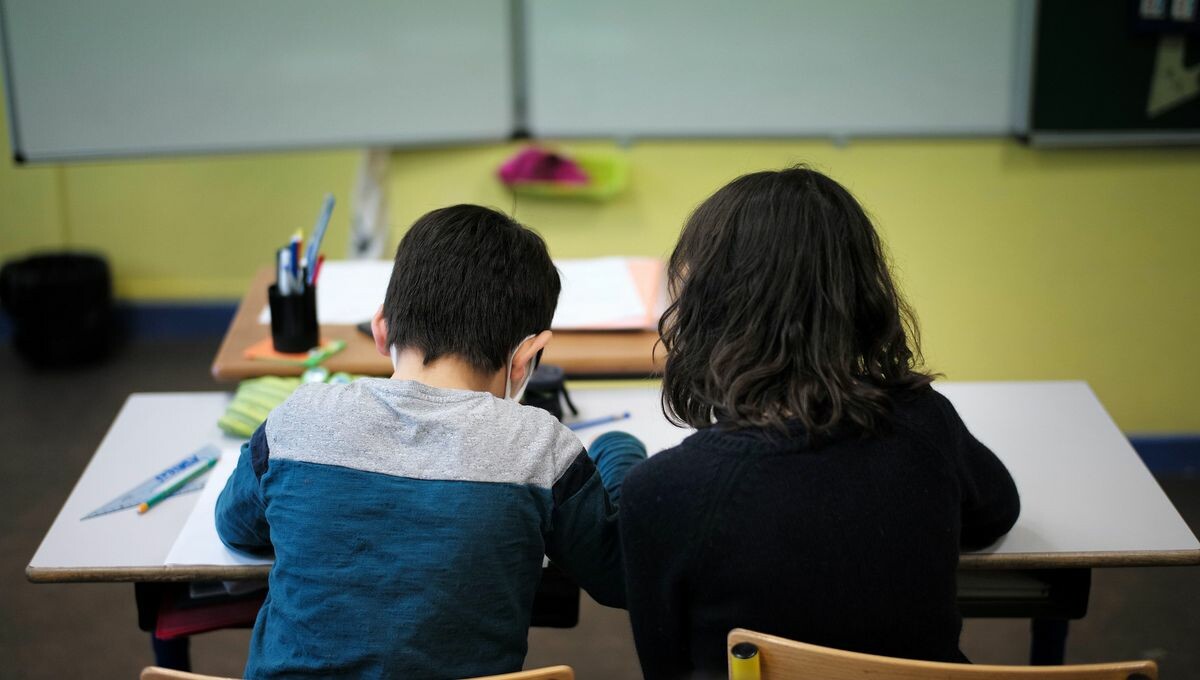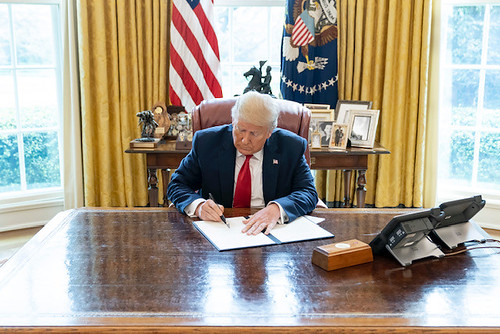"Writing has to do with the wound you're wearing."
- Orereta 1975. “He’s a Basque writer and photographer,” his resume says. He set his first novel, Kontrarioa, in the Pontika neighborhood, in his youth. On this occasion, it has regressed in time. He recreated childhood adolescence with the novel Gerra txikia. He has illustrated Hendaia very well. It tells the story of the Ugarte family. The protagonist is Xabi, the alter ego of the child Lander.
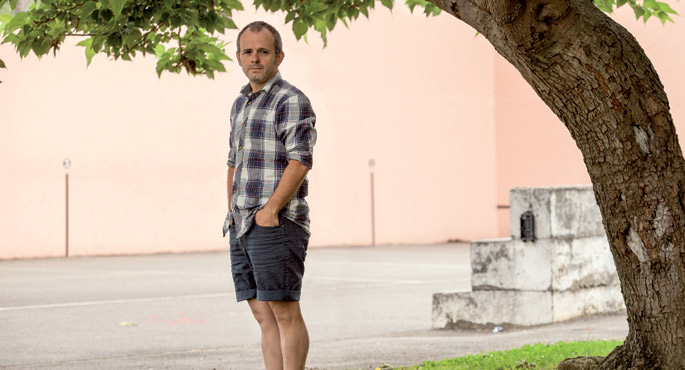
Lander Garro's profile was there: Social media user. Controversy and criticism. Television author and documentaries. The one on the Abertzale left, which was raised in the spiral of the Basque conflict. Suffering from the trauma of this conflict. Photographer, journalist, writer...
Who is Lander Garro?
To answer this question, I need to get to the depths of my life. I want to say something.
You have a reputation for being controversial, for being critical.
It has always been hard for me not to say what I think, but in recent years I have calmed down enough. I am convinced that what you say many times does not bring anything good. Now, if I can offend someone, just in case I don't say anything. It is true, I have always been in favour of expressing my thinking, I have been rigorous, but not lover of controversy.
Journalist...
I started working as a photographer at the age of sixteen [studied in Barcelona], I started writing about it. That critical being you say is what I owe you to be a journalist. In Pasaia, there was a magazine called Brankan. The authors used to leave it at the bar where I worked. I told what I was going to bring one day. “Why do you make the skins so miserable? Why don’t they take advantage of current techniques to do something right?” He looked at me in awe. I had two possibilities, one to offend or to do. “Hear, then, make your skin!” I started making the front cover and talking. The first interview was directed to the director of the Festival, Mikel Olaziregi.
What does he tell me about his status as a writer? And writers in general?
Writers are good readers at first, or at least passionate readers. After a while you find a gap: You think, "Of this, somebody should write." All writers start trying to write down what they haven't seen yet. Well, I started like that. I entered the world of literature with Koldo Izagirre and Eider Rodríguez. The kind of man I most admired was a writer. Somehow, I was kneeling before the writers of Euskal Herria. Then, as you get into the world, you get into a terrible disappointment, you discover that writers are people like you, who have your own shortcomings, lame, weaknesses. You go into a phase of heartbreak. You see literature with another attitude, with more irony. Now I look at the world of literature from the outside. I'm a father riding a bicycle with children. Literature -- it doesn't matter in a way.
Written in 2008 by Jokin Muñoz in Bazka magazine: "Lander Garro reflects the problem that people on the Abertzale left have with irony. They don’t understand the ironic game or they don’t want to understand it.”
Jokin Muñoz was a little right. But I would say frivolity rather than irony. That is, you can have in your life a relatively comfortable position to understand the game of frivolity. I may have a breath of life that allows him to live a comfortable space, but I didn't have that space at the time. I spent two long years in jail without guilt. I will always bear the pain that I was taken from two years of life. When a situation offends you a lot, you laugh at what they call democracy. He has the wound so open that it costs him a lot to get into the game of the joke, as he himself said. Today I would not answer him.
You've written the novel Gerra Txikia. Did you write in the novel what you wanted to tell?
Not quite. When I finish a book, I have two feelings: the first, that of surprise. When I start writing, I'm convinced that the ending will never come, it makes me long and complicated. So I take a surprise because I'm done. The second and, above all, the feeling that what I have written and what I wanted to write have almost nothing to do with it. The book has its whims, you have something in your head and you've written it in a totally different way. I try to write things that are dark, hard and depressing, but then I get the comical. “I laughed at your book,” they tell me. “It wasn’t my intention,” I say. I have a point of humor, that tendency to joke. Which hides people's sadness through the joke. Protect the darkness of life with the joke. Groucho Marx syndrome, in a way.
Childhood is the leitmotiv of Little War.
Childhood is very interesting to me when it comes to writing. Paradoxically, childhood not only explains our origin, but also explains the allegory we are. What are we also when we're older? We are puppets of this machine without mercy that we call time. Time takes us, we don't stop discovering our perdition, and in the face of it, we don't have great resources. Boys and girls are looking for these resources. That's why I'm interested in childhood or adolescence or the account of youth.
The protagonist is Xabi. What Xabi has for Lander.
Xabi is my alter ego, but it's not always me, of course. I work well in opposition to writing, for example in the opposition of Txirri and Mirri. But I'm not a shy Xabi, I'm not like that in life. Of course, I have that shy side, but I learned from a young age that I had to be more proud, because if not, I myself was getting all the slaps because, to begin with, I'm small.
The novel is set in Hendaia, on Aizpurdi Street in Hendaia.
Childhood is also our origin, a territory that explains where we came from. Aizpurdi Street is one of the great milestones of my childhood. There I knew that in the world there was no justice [I was 9 years old], that it doesn't look like anything in the world, that there is nothing reliable. The first lesson of the political system was “nothing is as they say”. I recognized death all of a sudden. To me until then death was abstract, it was not something concrete, it did not affect my life. “It’s not going to happen to me, it’s not going to happen to parents,” I thought...
However, “you would know that in that world death was close. An armed organization was involved...”, someone could say.
I knew there was an institution, but death was an abstract thing. We heard the TV news, we saw movies, people talked -- but not in my life. At nine years old, the feeling of loss was very confusing. When they killed Peru and Stein, death made all my sense. I mean, "those people are not going to be by my side anymore," I understood.
Xabi Ugarte. Who are the Ugarte?
Ugartetarrak is a unique and also normal family: working parents, large family, with relatively large economic deficiencies and which is politically compromised. Looking from today’s world, it seems that the decisions taken by some families back then were outside the world, but ETA was a tremendous social phenomenon that “caught” a lot of people. The decision was nothing intimate, it was a collective decision, a very normal thing.
Xabi came to Hendaia and knew the sad peace of mind.
In the South, everyone was involved in one way or another in the political world. When we got to the north we didn't see that. There was a large and plural collective flight, where there were workers, bourgeois, peasants, Portuguese, meek, generous, petty, of everything. The book has received this diversity.
He currently lives in Hendaia. Has it changed?
Nothing. When I was 20, I came back, and it was terrible to find that nothing had changed. Hendaia is the day to day of the marmote. In childhood, it was very hard for us to believe that we were in the Basque Country. Then we discovered the archeological footprints: some fisherman or an elder spoke in Euskera in the bakery, some streets had Euskaldunes names, and Euskal Jaiak, where people disguised themselves as baserritarras. Of course, at nine years old you do not have the minimum of political knowledge: we were a people, colonialism was established and customs, the French broke the Euskaldunity. You can’t tell that “film” to yourself. Because “this was France and nothing was happening here...” But as a custom, brothers and sisters, we would go out into the street and have a long conversation. I think that's why I'm so charlatan. We talked at least in childhood.
It is said that those who live in the conflict directly are not suitable for writing about the conflict.
Having experienced a conflict is not inappropriate for writing. On the contrary, I think it is perfect. In short, where does the author write? First of what was experienced and seen, after reading it. We have read the books that have written about conflict those who have lived through the conflict. For example, Primo Levi is a terrible model. First, because he lived and told the hell of Auschwitz, and second, because he told the deficiencies of the Jews in that hell. Some Jews brought Levi tremendous hardships. I, too, in this book, tell the life of the collective around ETA, but emphasizing weaknesses and errors. If the novel makes sense, it does so in that sense. If the novel is to praise anything, it is not worth it. There are tributes to this. The novel has to remove the powders from under the carpet. The mission of novelists is to have a magnifying glass hidden under events. In these cases, what that family lived, those frail people. A sample of how the facts have influenced people.
“We forget the things we have to remember and remember the things we must forget,” says the writer Cormac McCarthy.
I think I have the stigma of being from the Abertzale left, and I have been judged more by a supposed ideology than by what I have written. Some of you see in me a capped rather than a pencil writer, the ETA literary command, in a way. That fascinated me a lot, because above all, I'm a writer. According to this quote by McCarthy, the writer does not write from his ideology, but because he has ghosts to indoctrinate anyone, who lead to writing. The literary embodiment of these ghosts is subjective, not ideological. The books that are written to indoctrinate me are repugnant to me, I think, an attack on literature.
“The artist is a being dominated by his demons,” says William Faulkner. Did the devil Lander Garro win?
In creation, however, I see no ghosts. Creation has an artistic and therapeutic component. The artist is cured creatively. In a way he puts a plaster on his soul, but he is not content with any spirit. Writing has to do with the wound, the ego coming from the wound. With this ugly tendency of men to seem more beautiful than we are before others. However, the wound cannot be separated from creation.
“War is sad, dear, and not just for the gudaris,” says Eider Rodríguez. It comes to my memory, Blanki, the woman of Bixente Perurena.
That's the central axis of this book. When we tell stories of war or conflict, we get into statistical questions: here are several deaths, there are others. What I have left is this: What's happened to those of us who survive? With Blanki, with my mother, with my sister and my brother? Those of us who knew the conflict so closely, we cannot forget it. And historians can't do it right, those of us who stay alive have to talk and the novelists write.
Aljeriatik datoz Mohamed eta Said [izenak asmatuak dira], herri beretik. “Txiki-txikitatik ezagutzen dugu elkar, eskolatik”. Ibilbide ezberdinak egin arren, egun, elkarrekin bizi dira Donostian, kale egoeran. Manteoko etxoletan bizi ziren, joan den astean Poliziak... [+]
Olatz Salvador
Noiz: martxoaren 15ean.
Non: Deustuko jaietan.
------------------------------------------------
Martxoak beti du deustuarrontzat kolore berezia; urtero ospatzen ditugu jaiak, San Jose egunaren bueltan. Bi asteburu bete festa, eta urtetik urtera Deustuko... [+]
Euskal Herrian Euskarazek manifestazioa deitu du apirilaren 6rako, 11n EHEko bi kide epaituko dituztelako. Hiriburuetatik autobusak antolatzen ari dira. Bi helburu bete nahi dituzte, batetik, epaituak izango diren bi kideei babesa erakustea, eta bestetik, euskararentzat justizia... [+]
Pazienteek Donostiara joan behar dute arreta jasotzeko. Osasun Bidasoa plataforma herritarrak salatu du itxierak “are gehiago hondatuko” duela eskualdeko osasun publikoa.
EH Bilduk galdera sorta bat erregistratu zuen Eusko Legebiltzarrean Donostiako Metroaren igarobideko lanen gainkostua argitzeko. Informazio hori atzo jakinarazi zuen Susana Garcia Chueca Mugikortasun sailburu sozialistak.
Kirola eta oroimena uztartuko dituzte, bigarrenez, mendi-martxa baten bitartez. Ez da lehiakorra izanen, helburua beste bat delako. La Fuga izeneko mendi martxak 1938ko sarraskia gogorarazi nahi du. Ezkabako gotorlekuan hasi eta Urepelen amaituko da. Maiatzaren 17an eginen dute.
Martxoaren 19an amaitu zen proiektua aurkezteko epea, baina Errioxako PSOEk adierazi du Forestalia enpresak "interesa baztertu" duela. Enpresak bi parke eoliko eraiki nahi zituen Aragoiko lurretan, baina oraindik ez ditu lortu baimenak eta hori dute egitasmoa... [+]
Seaska Sarean inklusio egoeran dauden 165 ikasleei laguntza bermatzeko hasi dute kanpaina, antolaketa propioa eratuta. Frantziako Hezkuntza Ministerioaren jarrera salatu dute kanpaina aurkezteko prentsaurrekoan, behar bereziak dituzten haurren inklusiorako baliabide... [+]
Muga-zergak apirilaren 2tik aurrera ezarriko dira eta altzairuari eta aluminioari ezarritakoei batuko zaizkie. "Gurekin negozioa egiten duten eta gure aberastasuna eskuratzen duten herrialdeei ezarriko dizkiegu", AEBetako presidenteak adierazi duenez.
%90eko jarraipen "ia erabatekoa" izan du grebak, sindikatuen arabera. Gasteizko parkeak, lorategiak eta eraztun berdea mantentzen dituzte Enviser azpikontratako 90 langileek.
Aurten "Israel Premier Tech" txirrindularitza talde israeldarra ez da Lizarraldeko Miguel Indurain Sari Nagusia lasterketara etorriko. Berri ona da hori Palestinaren askapenaren alde gaudenontzat eta munstro sionistarekin harreman oro etetea nahi dugunontzat, izan... [+]
Ikerketa parte-hartzailea eta gogoetatsua bultzatzen du Biharamunen Lantegia kooperatibak, eta zientzia eta ikerketa herriarengana hurbiltzeko lan egiten du. Duela urte eta erditik egoitza Bidarten dauka, eta Institut Curie-rekin elkarlanean Iker Herria ikerketa zentroa sortzeko... [+]
Txotx denboraldian eredu ekologikoan ekoiztutako Euskal Sagardoaren eskaintza izango da hainbat sagardotegitan, eta hura bistaratzeko, Jatorri Deiturak eta ENEEK-Ekolurrak kupeletan paratzeko euskarria aurkeztu dute.
Intsumituek denbora luzez egindako borroka gogorra eta mingarria izan zen, baina irabazi zuten, eta garaipen hura behin betikoa izango zela uste genuen, atzera bueltarik gabea. Baina badirudi, politikari batzuen ahotik aterata, eskalada militaristari gorazarre egin eta berriz... [+]









